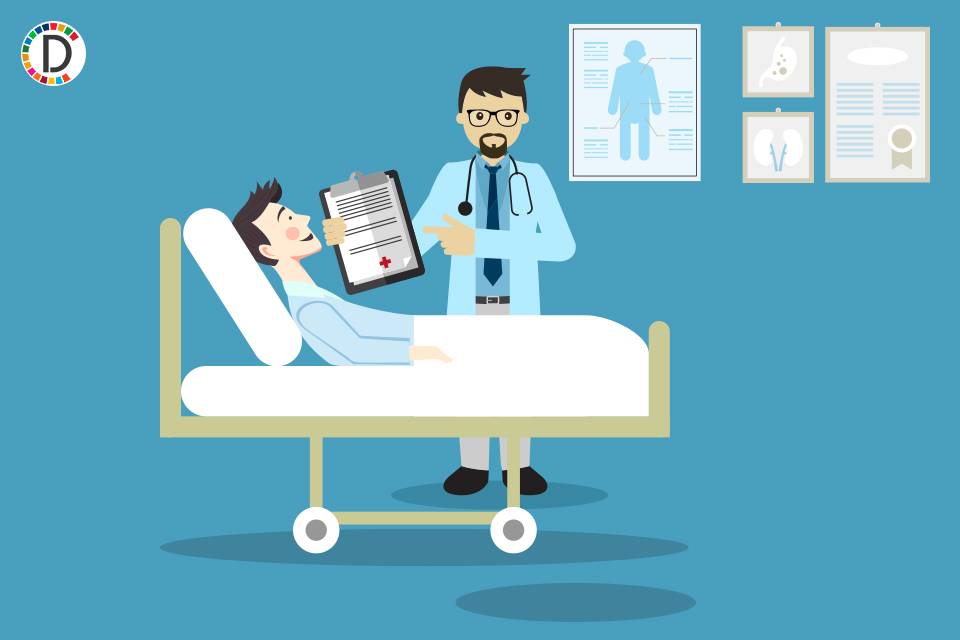Consumption of fruits, vegetables among adults inadequate: Survey

- Country:
- India
Consumption of fruits and vegetables among adults is inadequate, with 98.4 per cent of those surveyed consuming less than five servings per day, while more than two in five adults and one in four adolescents do insufficient physical activity, stated an ICMR survey released on Monday.
According to the National Noncommunicable Disease Monitoring Survey (NNMS), which was released by Union Health Minister Harsh Vardhan, more than one in every four adults and 6.2 per cent adolescents were overweight or obese.
It said almost three out of ten adults had raised blood pressure, 9.3 per cent had raised blood glucose, average daily intake of salt was 8 gms, while two in five adults had three or more risk factors for non-communicable diseases (NCDs).
The results also showed that, one in every three adults and more than one-fourth proportion of surveyed men used any form of tobacco and consumed alcohol in past 12 months respectively, the Health Ministry said.
Among the surveyed population aged 30-69 years, the proportion who had ever undergone screening for oral cancer (men and women) were 1.7 per cent, the report stated. Only 1.6 per cent women had been screened for breast cancer by clinical examination and 2.2 per cent for cervical cancer. ''Screening for cervical cancer in rural areas was three times lesser than urban areas,'' the report said. The estimated sample size for the survey, conducted during 2017-18 by ICMR-National Centre for Disease Informatics and Research (NCDIR), Bengaluru, was 12,000 adults (18-69 years) and 1,700 adolescents (15-17 years).
Vardhan, who presided over the foundation day celebrations and launch of the decadal year of the ICMR-National Centre for Disease Informatics and Research, Bengaluru through a video conference, released results from the largest comprehensive national survey on risk factors and health systems preparedness of NCDs along with the framework on use of telemedicine for cancer, diabetes, heart diseases and stroke.
Vardhan shared his deep gratitude on behalf of the whole country to the scientists of ICMR for their immeasurable contribution in controlling the pandemic. ''The year 2020 brings back memories of gloom due to COVID-19. Yet, it has also sowed hope. It was also the year of science and scientists. They not only eased the pressure on testing kits by developing indigenous kits but reversed the position completely with indigenous testing kits now being exported worldwide,'' Vardhan was quoted as saying in the statement.
ICMR was one of the first organizations worldwide to have isolated the virus as well as the mutant strain and has contributed in creating a biorepository of potential drug targets, he said.
''India is now producing and supplying vaccines to many countries, out of which one is developed indigenously in entirety; the entire scientific community should be credited for the achievement,'' he added.
''The survey was undertaken to provide baseline information on NCD risk factors and it highlights the need to improve comprehensive multi-sectoral approaches focussed on both prevention and management of NCDs. Regular surveillance of NCDs is critical to monitor the trends and to guide the interventions,'' Vardhan said.
Expressing his elation at the release of the National Non-communicable Disease Monitoring Survey (NNMS) across India which also tracks cancer, he said, ''The National Cancer Registry Program is a very valuable cancer surveillance tool for the country. Actions to tackle cancers benefit a lot from good and reliable data monitoring. This can help in targeted screening of uncommon cancers through mass NCD screening at Ayushman Bharat HWCs.'' He further asked Secretary (Health Research) to explore legislative actions on making reporting of all forms of cancer mandatory for better health outcomes.
He also released the Framework for Telemedicine use in Management of Cancer, Diabetes, Cardiovascular Disease and Stroke in India and said, ''Telemedicine with its components of tele-consultation, tele-monitoring, tele-triage can be integrated to build continuum of care model for major NCDs. The increasing burden of NCDs in India requires multipronged interventions that can address promotive, preventive, curative, rehabilitative aspects of NCD care and management. Telemedicine can bridge and link all these aspects. ''It can be adapted and used by medical practitioners from primary to tertiary health care level in India, through the national teleconsultation network and other similar platforms.'' He added that this will also encourage remote healthcare and minimize inconvenience to patients to travel to hospitals.
Vardhan also highlighted the need for stronger collaborative efforts. ''AIIMS Jhajjar has become a centre for excellent cancer Care. Cooperation between health practitioners and researchers is the way forward and the mode of video-conferences, which has surfaced in the times of COVID, should be utilized to the maximum." The Union health minister ended the meeting on a note of caution. ''A WHO survey some years back found that 45 per cent of NCDs are a result of physical inactivity. The Fit India Movement has gained significant momentum in generating awareness regarding this which needs to be further amplified. More gyms and exercise centers will invariably lessen the need for hospital infrastructure,'' he said.
(This story has not been edited by Devdiscourse staff and is auto-generated from a syndicated feed.)
- READ MORE ON:
- COVID
- The Fit India Movement
- Cardiovascular Disease
- Harsh Vardhan
- Vardhan
- Telemedicine
- Framework for Telemedicine
- Management of Cancer
- ICMR-National Centre for Disease Informatics and Research (NCDIR
- ICMR
- India
- Union Health
- Jhajjar
- Health Research
- Union
- Health Ministry
- National Noncommunicable Disease Monitoring Survey
- Ayushman
- National Cancer Registry Program
- ICMR-National Centre for Disease Informatics and Research










